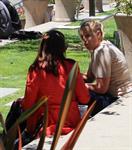Education is Changing.

It is hard to know what the future will look like; but mainstream ideas of attending lectures in a classroom are unlikely to be the "mainstream" concept of education in the future. Many who have built careers on the idea of large numbers of students listening to a teacher talk. A lot of those career teachers feel threatened by uncertain change. Others who are contemplating a career in education are likewise, feeling uncertain.
The thing about change though is that every industry is changing, not just education; and change not only destabilizes the past, but it offers wonderful and unique opportunities for the future.
If you can start to see alternative education as an opportunity rather than a niche industry, or a threat to the mainstream -you will be on the road to finding a whole new world of exciting and potentially profitable career prospects.
Education may be changing; but people will always need to learn. The only real thing that is changing is where, how and what we learn!
Modules
Note that each module in the Qualification - Certificate In Alternative Education is a short course in its own right, and may be studied separately.
There are many different approaches to teaching.
Some are teacher centred, others student centred.

Teacher-centred learning
Traditional education has been teacher-centred, based on the imparting of information through lectures, set readings, and teacher-controlled experiences. The curriculum is set by the school or the teachers, and delivered in a way that the teaching staff have firm control over what information is provided to the students, and how. The fundamental assumption is that the teacher’s role is as provider of the information; the student’s is as receiver of the information.
Traditional education is therefore often described as information-based. The aims are:
- the teacher will impart pre-selected information to a student
- the student will study and retain that information
- the student’s progress or learning will be assessed by his or her ability to present that information correctly in the required forms (e.g. essays, definitions, answers to questions).
The success of information-based courses is assessed by determining what information the student has retained at the end of the course. Therefore, the key communication skills required from the teacher are ability to present information clearly, unambiguously, and logically, and to explain new or complex concepts, processes or ideas in a way that maximises student understanding. For the student, key communication skills are the ability to listen and read attentively to select relevant information, to take notes quickly, to communicate where needed to gain further clarification, and to present information clearly in writing and verbally.
Because it has a long tradition, and many people have been educated in this way from their early years, many students expect this kind of education when they enrol in a course, and may feel uncomfortable or dissatisfied with courses that do not follow this basic pattern.
Student-centred learning
 There are various methods of using student-centred learning, some based almost wholly on student experience, others based on student interest and motivation to study about certain things, some based on student problem-solving, some based on student discussion or group work, and yet others based on issues that are of relevance to the students and their society and content that is selected by the students. What they all have in common is sharing with the student at least some control over what is learned and how it is learned.
There are various methods of using student-centred learning, some based almost wholly on student experience, others based on student interest and motivation to study about certain things, some based on student problem-solving, some based on student discussion or group work, and yet others based on issues that are of relevance to the students and their society and content that is selected by the students. What they all have in common is sharing with the student at least some control over what is learned and how it is learned.
Generally speaking, the aims of student-centred learning are:
- the teacher provides relevant information or access to it
- the student engages with that information with some form of problem-solving or project planning, developing relevant skills and knowledge as needed to complete the task
- the teacher takes a facilitating role to support and monitor the student’s efforts
- the student demonstrates understanding and knowledge gained through reflection upon the practical exercise. (You can read more about student-centred learning on the internet. Do a web search under ‘student-based education’ to begin with).
Student success may be assessed by a variety of methods that can include essays, answering questions etc. but usually include some kind of practical application of the information learned, and some kind of assessment of the student’s ability to draw conclusions, understand implications, and respond individually to the course content. Therefore, key communication skills in student-centred learning are the ability to give and follow instructions effectively, to give and request specific information, to communicate to reach agreement on goals and requirements, to clearly and assertively communicate needs and opinions, to distinguish between essential and non-essential or relevant and irrelevant information, and to establish and maintain productive relationships, plus those mentioned above (logical presentation of information, explain complex information). Both student and teacher require these skills in student-centred learning.
Research has shown that student-centred courses are more productive learning experiences than teacher-centred courses. It shows that with student-centred learning, student motivation is stronger and learning is far more effective.
Examples of Student Centred Education
Problem based learning (PBL)
This system is based on students learning to use critical thinking skills to solve ‘real life’ problems. PBL is discussed in greater detail later in this lesson.
Experiential learning
These are courses that focus on the experiences that a student goes through, and the learning that comes from undergoing those experiences. The success of experiential courses needs to be assessed not only on information which is acquired, but also on less tangible things such as attitudes that have changed. Here every step in the whole experience, and not just the end result, is equally important.
Montessori education
The Montessori approach was developed for educating young children in Italy, and now has a wide following globally. Montessori-based pre-schools operate in many parts of the world. Montessori education allows the child to determine what he/she will learn, and even how he or she will learn. It provides options, exposure to ideas and information, and the facility for different individuals to pursue different learning experiences at the same time. Research has shown significant advantages in Montessori education.
 Self paced learning
Self paced learning
In this system, students are able to choose when, and also possibly what, to learn. The system recognises that every person learns and completes tasks at a different rate to others. The mode of education may be applied in traditional classroom situations, but is more commonly used in open and distance education.
Education is changing rapidly in todays world.
This is a course for people who have a vision of the future and wish to be part of these changes; helping to forge new and exciting alternative approaches to education that are better suited to the modern world.
Learning Facilities
ACS follows the old fashioned idea that “the student comes first”. Our staff are told to treat every student as an individual and respond promptly to their enquiries; and the facilities we have developed and continue to develop, are all focused on that goal. Facilities include:
- Offices in two time zones (UK and Australia) –which means an international team of academics are responding to students 5 days a week and 16 hours a day.
- An online student room with unique resources that are only available to students studying our courses, including online library.
- Bookshop offering quality downloadable e books
- A data base of 20 million words of unique information written by our staff over 3 decades that can be drawn upon if needed by academics for use in supporting our students.
- Systems that ensure assignments are tracked, marked and returned to students, fast -commonly within a round 1 week & rarely more than 2 weeks (note: many other colleges take longer).
- The school is active in social networking and encourages students to connect with us and each other.
- No automated handling of student phone enquiries. When you call you get a real person; or leave a message and a real person will call you back within a day, but more commonly within an hour or two.
- No additional charges for extra tutor support over the phone or email.
- Free careers advice for graduates –It is our policy to provide support and advice to our students even after they graduate. If a graduate needs help with getting a CV together, or advice on setting up a business or looking for work; they only need ask.
- The quality of academic staff is higher than many other colleges.
How our Courses Differ
- Courses are continually improved –we invite feedback from all graduates and change courses immediately the need is detected.
- Courses are relevant to the whole world –we try hard to teach make the learning transferable to any region or country because the world is increasingly a global economy
- Courses written by our staff, teach different skills to standard courses; giving a unique mix of skills and knowledge to provide a career advantage. Do you want an accredited certificate and the same skills as 100 other job applicants; or one of our courses with skills that no other applicants have?
- Certificates and diplomas are longer. They teach you more, and our qualifications have built a reputation amongst academics and industry as being a very high standard for this reason.
- We are focused on helping you learn in a way that improves your capacity to understand your discipline, apply knowledge, and continue learning and developing your capabilities beyond your course.
These things cannot be always said of other colleges.
Career Opportunities
Study alone can never guarantee career success; but a good education is an important starting point.
Success in a career depends upon many things. A course like this is an excellent starting point because it provides a foundation for continued learning, and the means of understanding and dealing with issues you encounter in the workplace.
When you have completed an ACS course, you will have not only learnt about the subject, but you will have been prompted to start networking with experts in the discipline and shown how to approach problems that confront you in this field.
This and every other industry in today’s world is developing in unforeseen ways; and while that is unsettling for anyone who wants to be guaranteed a particular job at the end of a particular course; for others, this rapidly changing career environment is offering new and exciting opportunities almost every month.
If you want to do the best that you can in this industry, you need to recognise that the opportunities that confront you at the end of a course, are probably different to anything that has even been thought of when you commence a course.
